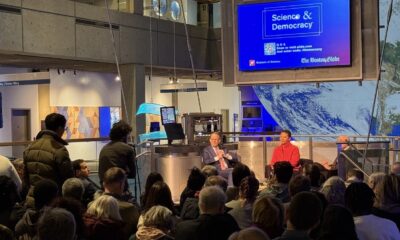Stories in Science Special Series
You’re the Surgeon?
Dr. Qaali Hussein: “Despite my academic standing and extracurricular activities, my pursuit of surgery has always been received as an improbable endeavor. A hijab wearing Muslim girl was nobody’s idea of what a surgeon should be. And when I did make it into surgery despite the promises of inevitable failure, my motherhood became the new reason for the calls to quit surgery.”

Qaali Hussein, MD
[su_boxbox title=”About” box_color=”#262733″] Dr. Qaali Hussein is a Board Certified Trauma/Acute Care, and surgical intensivist who practices in Florida. This story was originally published on April 16, 2018 on Medium. The revised version is re-published here with permission from Dr. Qaali Hussein. [/su_boxbox]
[dropcap]D[/dropcap]espite my academic standing and extracurricular activities, my pursuit of surgery has always been received as an improbable endeavor. A hijab wearing Muslim girl was nobody’s idea of what a surgeon should be. And when I did make it into surgery despite the promises of inevitable failure, my motherhood became the new reason for the calls to quit surgery.
But wait. Where did it all start?
Well, my fascination with how the human body works was what attracted me to science. Learning about illnesses and that we are capable of fixing some of these made me eventually fall in love with surgery.
Fast forward many years of training, I now find myself meeting most of my patients in what is mostly one of their worst days.
They’re critically ill from either an injury or a general surgical emergency. As trauma and critical care surgeons, it is common for us to treat the underlying problem first, with either emergency consent or that of the family, and then meet our patients afterwards.

Dr. Qaali Hussein
When patients recover and I finally introduce myself, they are usually puzzled and confused. They ask, just to confirm, “Who’s the surgeon, again?” I initially attributed this confusion to my gender as there is always less reluctance to call my male medical students, residents, and physician assistants doctors while I am more readily identified as the nurse. When the clarification is made as to who the physician is, the confusion persists. At this point, there’s usually a double take and the question turns into “You’re the surgeon?” with a sense of disbelief.
I’ve grappled with how to respond to this question for quite some time. I usually laugh and say, “I may look 17 but I’ve got a lot of gray hair under this scarf,” referring to my hijab. There’s really not that many gray hairs but it usually comforts my patients and we move on to discussing their care.
I, on the other hand, am not comforted by these frequent encounters. I don’t take offense to the question or the reaction of disbelief in the fact that a hijab-wearing Muslim woman can be a surgeon. I’m saddened that in 2018 the question, You’re a surgeon?, is still being asked. With women accounting for approximately 50% of medical school graduates, and with more women pursuing surgery, it should not be a surprise that women from diverse backgrounds can be surgeons as well. What is not at all surprising is that pursuing surgery continues to be difficult for women, especially when childbearing is considered.
I have been called a terrorist by a patient, been given multiple lectures on what the “true religion” is, and have had patients refuse my care because of my last name and my faith but I have also had great rapport with many more patients because of my hijab.
With residency occurring in the most productive years of a woman’s life, the already difficult surgery residency becomes exponentially more challenging if you add in pregnancy. There is a negative stigma about pregnant female surgical trainees. This attitude is so pervasive that many women surgeons postpone childbearing and possibly put themselves and their children at risk for complications related to advanced maternal age. In addition, some women are even encouraged to quit surgery and pursue more “family friendly” specialties when they become pregnant. I almost did not pursue surgery because of these aspects of surgical culture.
I was lucky to have met Dr. John Bawduniak, a surgery resident at the time, who advised me during the application process that residency is a finite amount of time and that I should pursue my true passion. Thanks to his sage advice, I changed from applying to a “family friendly” field to applying for my true passion, general surgery. Although I enjoyed the experience of learning to operate and care for surgical patients, I did not enjoy being told to quit surgery simply because I became a mother. I have always desired to have a large family and I did not want to give up that very personal dream because of my love for surgery. I wanted both!
So, although unusual, I had five pregnancies and six kids during residency and fellowship. The response to my being pregnant as a fellow was no different than the response I was given as a pregnant intern. There’s a lot to be said when it is easier to overcome language and cultural barriers than it is to deal with the difficulties of being a pregnant surgery resident. I have certainly had other challenges as a hijab-wearing Muslim surgeon. I have been called a terrorist by a patient, been given multiple lectures on what the “true religion” is, and have had patients refuse my care because of my last name and my faith but I have also had great rapport with many more patients because of my hijab.
Overall, I don’t worry about my hijab being an issue for me as a surgeon. Do we need more diversity in surgery? Certainly, and there are many opportunities for us to improve on inclusion. What worries me is the treatment of women in surgery residencies and in practice where motherhood is considered a disqualifying event, hence discouraging more women from pursuing surgery and surgical subspecialties. The reality is, most of our patients don’t really care what we look like, where we come from, or whether we took maternity leave or not. What they need is a competent surgeon to take care of them in their most vulnerable state.
These experiences have not only taught me the importance of persistence but that social inequities still persist in women’s career pursuits. Artificial road blocks are pointed out as reasons to quit instead of alternative routes to success being offered. I’m reminded of the oddity of my being a surgeon on almost daily basis. In today’s political climate of rampant discrimination against immigrants and Muslims as well as the spotlight on widespread misogyny, I believe it’s imperative that we change the narrative and speak up to defy these stereotypes we’re labeled with and demand change.
Cover Image by Engin Akyurt from Pixabay | CC0 Creative Commons
Metrics
Sessions
Total number of Sessions. A session is the period time a user is actively engaged with the page.
Visitors
Users that have had at least one session within the selected date range. Includes both new and returning users.
Page views
Pageviews is the total number of time the article was viewed. Repeated views are counted.
The CS Media Lab is a Boston-anchored civic science news collective with local, national and global coverage on TV, digital print, and radio through CivicSciTV, CivicSciTimes, and CivicSciRadio. Programs include Questions of the Day, Changemakers, QuickTake, Consider This Next, Stories in Science, Sai Resident Collective and more.

-
Audio Studio1 month ago
“Reading it opened up a whole new world.” Kim Steele on building her company ‘Documentaries Don’t Work’
-
 Civic Science Observer1 week ago
Civic Science Observer1 week ago‘Science policy’ Google searches spiked in 2025. What does that mean?
-
Civic Science Observer1 month ago
Our developing civic science photojournalism experiment: Photos from 2025
-
Civic Science Observer1 month ago
Together again: Day 1 of the 2025 ASTC conference in black and white
Contact
Menu
Designed with WordPress

























